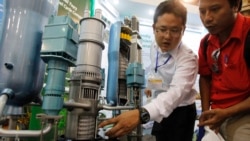Bilateral relations between the United States and Vietnam took another step forward this month as President Barack Obama sent the U.S. Congress for its review a civilian nuclear cooperation agreement with the Southeast Asian nation.
The pact, initialed on the sidelines of the Association of Southeast Asian Nations summit in Brunei last fall, would establish a legal framework for U.S. nuclear trade with Vietnam. As part of this agreement, Vietnam reaffirmed its commitment to rely on existing international markets for nuclear fuel services rather than acquiring sensitive nuclear technologies itself, including enrichment and reprocessing technologies.
Simply stated, our partnership would strengthen the international nuclear nonproliferation regime by requiring Vietnam to observe stringent controls, implement nuclear safeguards and obtain U.S. consent before retransfer or reprocessing of U.S. material or equipment.
Concluding such an agreement with Vietnam builds upon existing bilateral cooperation on nuclear power research and development, safe management of nuclear materials, infrastructure development and worker training. It will also enable U.S. companies to export nuclear equipment and fuel to the Vietnamese nuclear power industry, helping them gain access to a critical market.
Over the next 20 years, Vietnam plans to build up to 13 nuclear power plants. Its nuclear power market, already the second largest in East Asia, is predicted to grow from $10 billion to $50 billion by the year 2031. Gaining access to this market will benefit U.S. companies and support U.S. job growth. Moreover, modern U.S. designs will increase safety standards by offering Vietnam the most reliable equipment on the market.
The agreement reflects both the strength and breadth of the 2013 U.S.-Vietnam Comprehensive Partnership, which supports Vietnam's aspirations for a peaceful nuclear energy program with the highest standards of safety, nonproliferation safeguards and security.
The pact, initialed on the sidelines of the Association of Southeast Asian Nations summit in Brunei last fall, would establish a legal framework for U.S. nuclear trade with Vietnam. As part of this agreement, Vietnam reaffirmed its commitment to rely on existing international markets for nuclear fuel services rather than acquiring sensitive nuclear technologies itself, including enrichment and reprocessing technologies.
Simply stated, our partnership would strengthen the international nuclear nonproliferation regime by requiring Vietnam to observe stringent controls, implement nuclear safeguards and obtain U.S. consent before retransfer or reprocessing of U.S. material or equipment.
Concluding such an agreement with Vietnam builds upon existing bilateral cooperation on nuclear power research and development, safe management of nuclear materials, infrastructure development and worker training. It will also enable U.S. companies to export nuclear equipment and fuel to the Vietnamese nuclear power industry, helping them gain access to a critical market.
Over the next 20 years, Vietnam plans to build up to 13 nuclear power plants. Its nuclear power market, already the second largest in East Asia, is predicted to grow from $10 billion to $50 billion by the year 2031. Gaining access to this market will benefit U.S. companies and support U.S. job growth. Moreover, modern U.S. designs will increase safety standards by offering Vietnam the most reliable equipment on the market.
The agreement reflects both the strength and breadth of the 2013 U.S.-Vietnam Comprehensive Partnership, which supports Vietnam's aspirations for a peaceful nuclear energy program with the highest standards of safety, nonproliferation safeguards and security.






